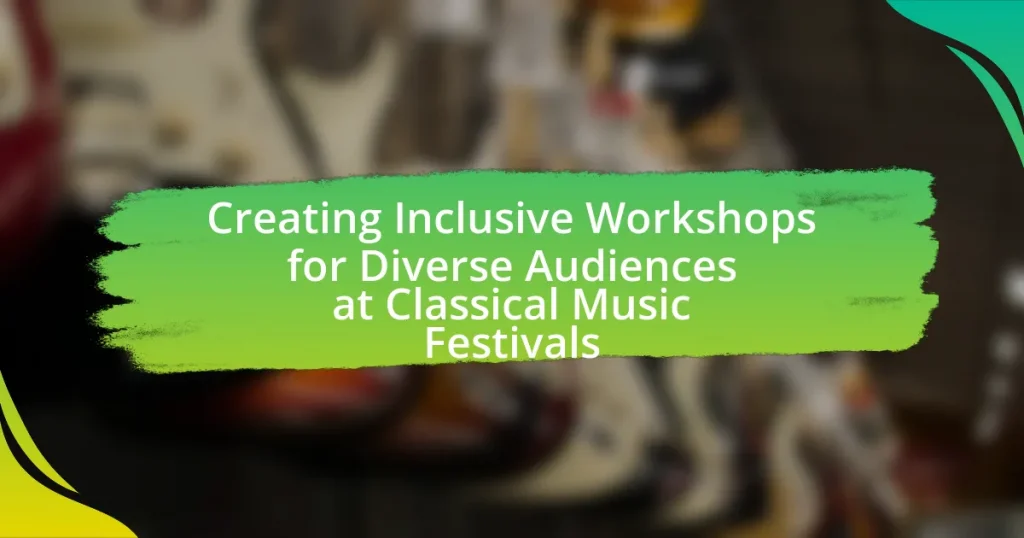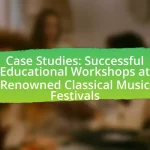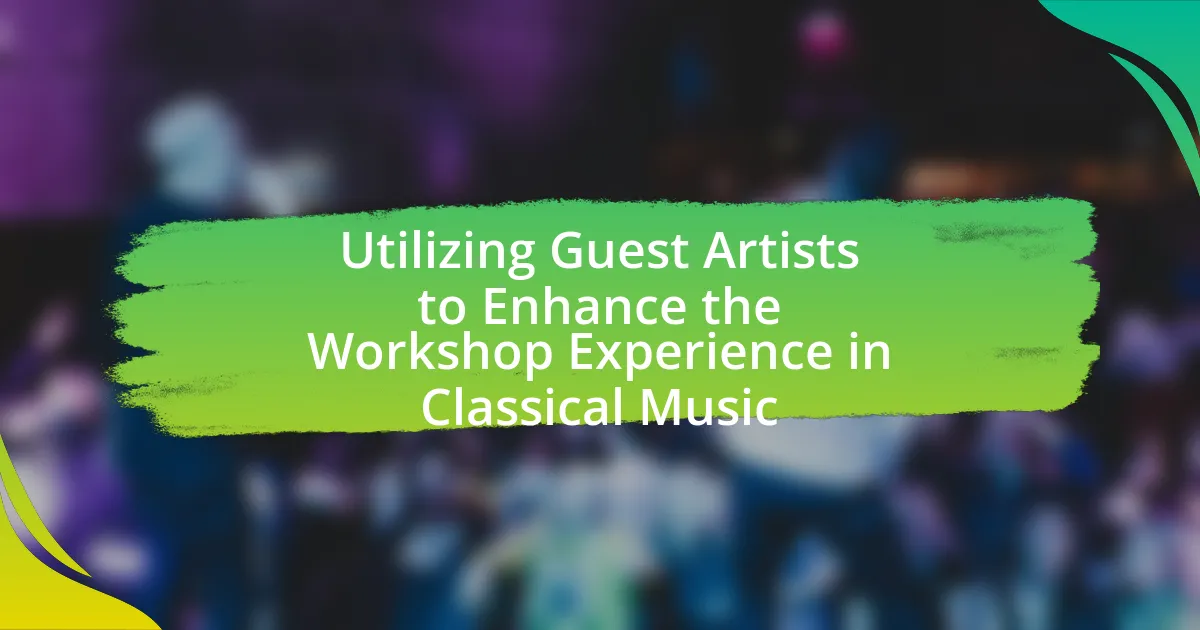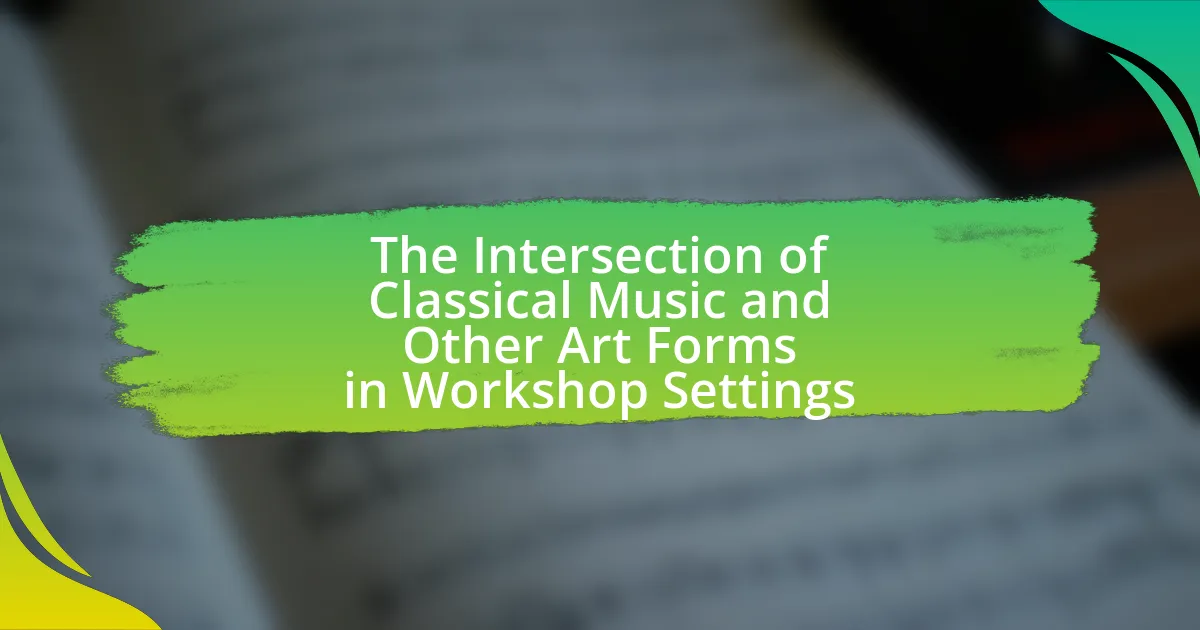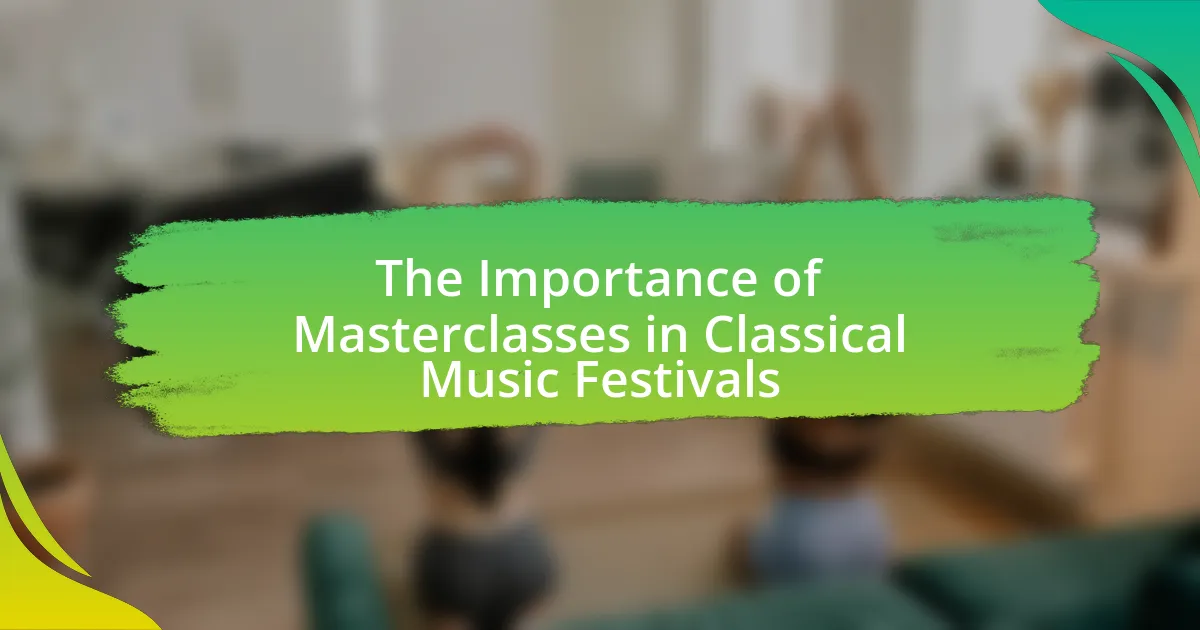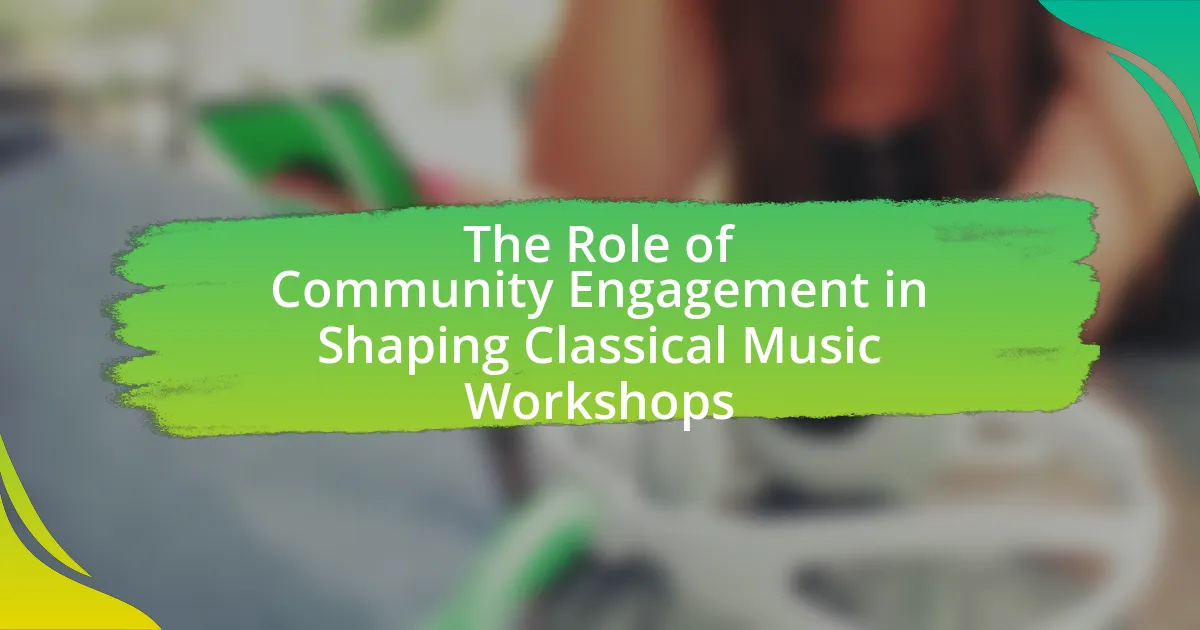Creating inclusive workshops for diverse audiences at classical music festivals involves designing interactive sessions that engage participants from various backgrounds, including different ages, cultures, and abilities. These workshops prioritize accessibility and inclusivity, contrasting with traditional formats that often cater to homogeneous groups. Key strategies for success include tailored content, adaptive teaching methods, and community involvement, which enhance participant engagement and satisfaction. The article also addresses challenges such as budget constraints and the importance of feedback in improving workshop design, ultimately highlighting how inclusivity enriches the overall festival experience and fosters cultural diversity.
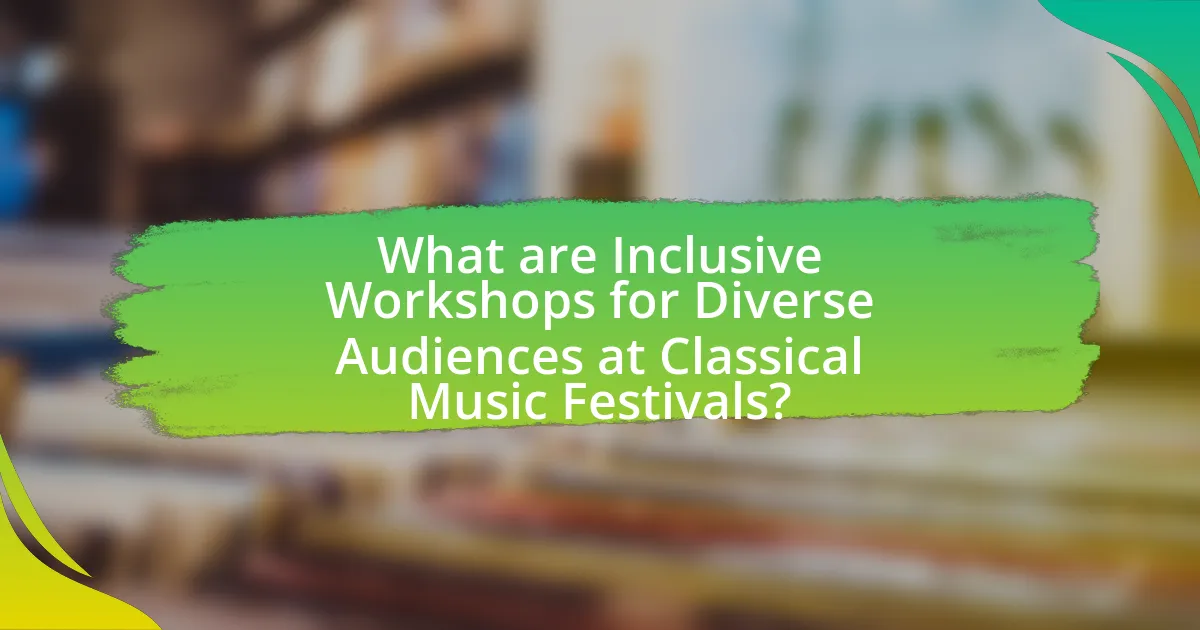
What are Inclusive Workshops for Diverse Audiences at Classical Music Festivals?
Inclusive workshops for diverse audiences at classical music festivals are interactive sessions designed to engage participants from various backgrounds, including different ages, cultures, and abilities. These workshops aim to break down barriers to participation in classical music by providing accessible learning experiences that encourage creativity and collaboration. For instance, they may include hands-on activities, discussions, and performances that reflect the cultural diversity of the community, thereby fostering a sense of belonging and appreciation for classical music among all attendees.
How do these workshops differ from traditional workshops?
These workshops differ from traditional workshops by emphasizing inclusivity and accessibility for diverse audiences. Traditional workshops often cater to a homogeneous group, focusing on standard teaching methods that may not engage all participants. In contrast, inclusive workshops incorporate varied teaching styles, cultural perspectives, and interactive elements to accommodate different learning preferences and backgrounds, thereby fostering a more engaging environment. Research indicates that inclusive practices enhance participation and satisfaction, as evidenced by studies showing increased engagement levels among diverse groups in educational settings.
What specific needs do diverse audiences have in a workshop setting?
Diverse audiences in a workshop setting require tailored content, accessibility, and inclusive facilitation. Tailored content ensures that the material resonates with various cultural backgrounds, learning styles, and interests, which enhances engagement and understanding. Accessibility includes providing materials in multiple formats, ensuring physical spaces accommodate individuals with disabilities, and offering language support for non-native speakers. Inclusive facilitation involves recognizing and valuing different perspectives, encouraging participation from all attendees, and creating a safe environment for sharing ideas. Research indicates that workshops designed with these specific needs in mind lead to higher satisfaction and learning outcomes among participants, as evidenced by studies showing increased engagement and retention rates in diverse groups.
How can inclusivity enhance the overall festival experience?
Inclusivity enhances the overall festival experience by fostering a sense of belonging among diverse attendees. When festivals prioritize inclusivity, they create an environment where individuals from various backgrounds feel valued and engaged, leading to increased participation and enjoyment. Research indicates that inclusive practices can improve audience satisfaction; for instance, a study by the National Endowment for the Arts found that diverse programming attracts a wider audience and enhances community engagement. By ensuring accessibility and representation, festivals can enrich the cultural exchange and create memorable experiences for all participants.
Why is it important to create inclusive workshops?
Creating inclusive workshops is important because they foster a sense of belonging and engagement among diverse participants. Inclusive workshops allow individuals from various backgrounds to share their perspectives, which enhances creativity and innovation in the learning environment. Research indicates that diverse teams are 35% more likely to outperform their homogeneous counterparts, as they bring a wider range of ideas and solutions to the table. By prioritizing inclusivity, workshop facilitators can ensure that all voices are heard, leading to richer discussions and a more comprehensive understanding of the subject matter.
What impact does inclusivity have on audience engagement?
Inclusivity significantly enhances audience engagement by fostering a sense of belonging and connection among participants. When workshops are designed to be inclusive, they attract a diverse range of attendees, which enriches the overall experience and encourages active participation. Research indicates that inclusive environments lead to higher satisfaction rates; for instance, a study by the National Endowment for the Arts found that diverse programming increases attendance and engagement levels by up to 30%. This demonstrates that when audiences feel represented and valued, they are more likely to engage fully with the content and contribute to discussions, ultimately leading to a more dynamic and interactive experience at classical music festivals.
How does inclusivity contribute to the cultural richness of classical music festivals?
Inclusivity enhances the cultural richness of classical music festivals by fostering diverse perspectives and experiences that enrich the artistic expression presented. When festivals actively include various cultural backgrounds, they attract a wider range of artists and audiences, leading to a more vibrant and multifaceted program. For instance, festivals that incorporate works from underrepresented composers or feature performances that blend different musical traditions create a richer tapestry of sound and storytelling. This diversity not only broadens the appeal of classical music but also encourages collaboration and innovation among musicians, ultimately leading to a more dynamic cultural exchange.
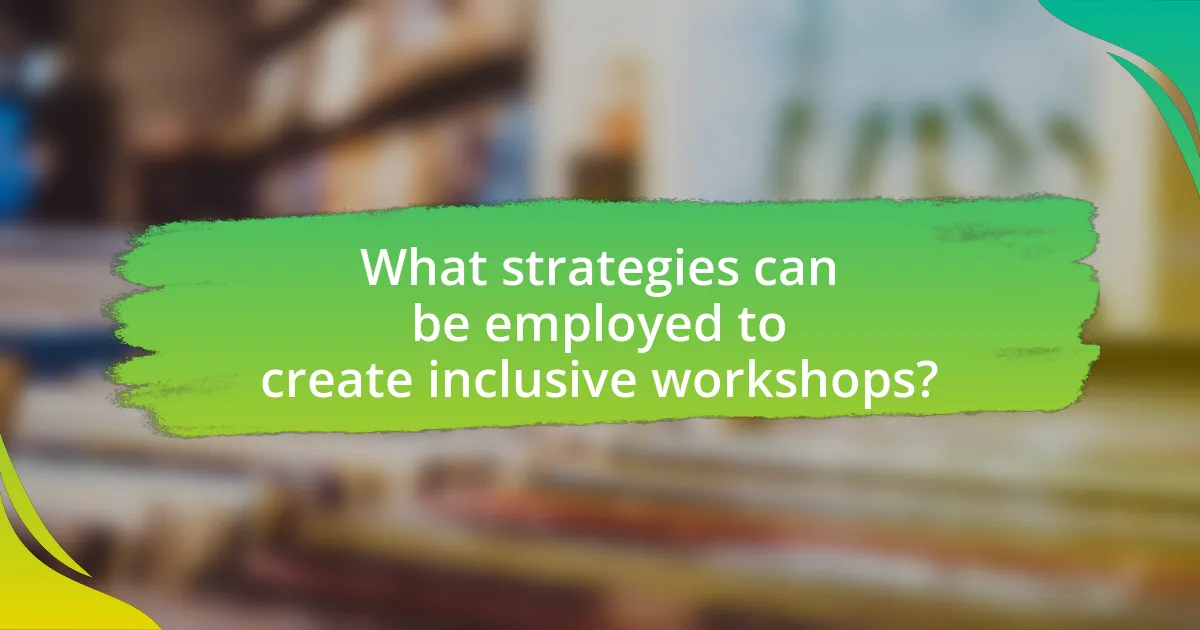
What strategies can be employed to create inclusive workshops?
To create inclusive workshops, facilitators should implement strategies such as diverse representation in planning, accessible materials, and adaptive teaching methods. Diverse representation ensures that various perspectives are included, which can enhance the relevance and relatability of the content. Accessible materials, including translations and formats for individuals with disabilities, cater to a wider audience, ensuring everyone can participate fully. Adaptive teaching methods, such as differentiated instruction and interactive activities, accommodate different learning styles and needs, fostering an inclusive environment. Research indicates that inclusive practices in educational settings lead to improved engagement and satisfaction among participants, highlighting the effectiveness of these strategies.
How can facilitators ensure accessibility for all participants?
Facilitators can ensure accessibility for all participants by implementing universal design principles in their workshops. This includes providing materials in multiple formats, such as large print, braille, and digital formats, to accommodate various needs. Additionally, facilitators should ensure physical accessibility by selecting venues that are wheelchair accessible and equipped with necessary facilities. According to the Americans with Disabilities Act (ADA), public spaces must be accessible to individuals with disabilities, which reinforces the importance of these considerations. Furthermore, facilitators can offer sign language interpretation and assistive listening devices to support participants with hearing impairments. By proactively addressing these aspects, facilitators create an inclusive environment that allows all participants to engage fully in the workshop experience.
What are the best practices for accommodating individuals with disabilities?
The best practices for accommodating individuals with disabilities include ensuring physical accessibility, providing appropriate communication methods, and offering tailored support services. Physical accessibility involves making venues wheelchair-friendly, providing accessible restrooms, and ensuring clear pathways. Communication methods should include sign language interpreters, captioning services, and materials in accessible formats. Tailored support services may involve personal assistance, sensory-friendly environments, and flexible scheduling to meet diverse needs. These practices are supported by the Americans with Disabilities Act, which mandates equal access and reasonable accommodations in public spaces.
How can language and communication be adapted for diverse audiences?
Language and communication can be adapted for diverse audiences by utilizing clear, inclusive language and employing various communication methods tailored to the audience’s needs. For instance, using simple vocabulary and avoiding jargon ensures that individuals from different educational backgrounds can understand the content. Additionally, incorporating visual aids, such as images and videos, can enhance comprehension for those with varying levels of literacy or language proficiency. Research indicates that using multiple languages in materials can also increase accessibility, as seen in events that provide translations or bilingual facilitators, thereby fostering a more inclusive environment.
What role does community involvement play in workshop design?
Community involvement is essential in workshop design as it ensures that the content and structure resonate with the target audience’s needs and preferences. Engaging community members in the planning process allows for the incorporation of diverse perspectives, which enhances the relevance and effectiveness of the workshops. Research indicates that workshops designed with community input are more likely to achieve higher participation rates and satisfaction levels, as they reflect the interests and cultural contexts of the participants. For instance, a study by the National Endowment for the Arts found that community-driven programs significantly increased engagement in arts-related activities, demonstrating the positive impact of local involvement on workshop success.
How can local communities contribute to the development of workshop content?
Local communities can contribute to the development of workshop content by actively participating in the planning process and sharing their unique cultural perspectives. Engaging community members allows for the incorporation of diverse musical traditions and practices, which enriches the workshop experience. For instance, a study by the National Endowment for the Arts highlights that community involvement in arts programming leads to more relevant and appealing content, as it reflects the interests and needs of the local population. This collaborative approach ensures that workshops resonate with attendees, fostering a more inclusive environment at classical music festivals.
What partnerships can enhance the inclusivity of workshops?
Partnerships with community organizations, educational institutions, and accessibility advocates can enhance the inclusivity of workshops. Community organizations can provide insights into the needs of diverse populations, ensuring that workshops are relevant and accessible. Educational institutions can facilitate outreach to underrepresented groups, promoting participation through targeted programs. Accessibility advocates can offer expertise in creating environments that accommodate individuals with disabilities, ensuring that all participants can engage fully. These partnerships collectively contribute to a more inclusive atmosphere, fostering a sense of belonging and participation among diverse audiences at classical music festivals.
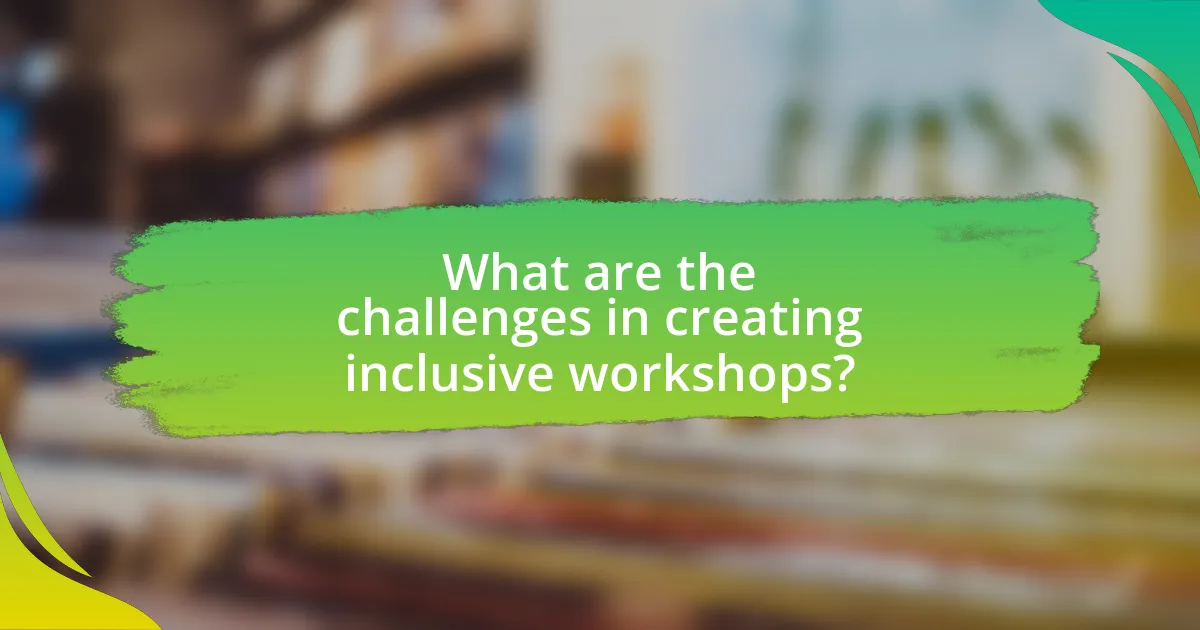
What are the challenges in creating inclusive workshops?
Creating inclusive workshops faces several challenges, including diverse participant needs, accessibility issues, and cultural sensitivity. Diverse participant needs require facilitators to tailor content and delivery methods to accommodate varying skill levels, backgrounds, and learning styles. Accessibility issues often arise from physical barriers, such as venue layout, and technological barriers, such as the availability of assistive devices. Cultural sensitivity is crucial, as facilitators must navigate different cultural norms and values to ensure that all participants feel respected and included. These challenges can hinder the effectiveness of workshops if not addressed, as evidenced by studies showing that inclusive practices enhance participant engagement and satisfaction.
What common barriers do organizers face when planning these workshops?
Organizers face several common barriers when planning workshops for diverse audiences at classical music festivals. One significant barrier is the lack of funding, which limits the ability to hire qualified facilitators and secure appropriate venues. Additionally, logistical challenges such as scheduling conflicts and accessibility issues can hinder participation from various demographic groups. Research indicates that 70% of event organizers cite budget constraints as a primary obstacle, while 60% report difficulties in ensuring venues are accessible to all attendees. These barriers can ultimately affect the inclusivity and effectiveness of the workshops.
How can budget constraints affect the inclusivity of workshops?
Budget constraints can significantly limit the inclusivity of workshops by reducing the resources available for outreach, materials, and accessibility accommodations. When financial limitations are present, organizers may prioritize cost-cutting measures that can exclude marginalized groups, such as offering fewer scholarships or failing to provide necessary support for individuals with disabilities. Research indicates that workshops with adequate funding are more likely to implement diverse programming and reach a broader audience, as seen in studies conducted by the National Endowment for the Arts, which highlight the correlation between funding levels and participant diversity in arts education initiatives.
What strategies can be implemented to overcome these challenges?
To overcome challenges in creating inclusive workshops for diverse audiences at classical music festivals, organizers can implement targeted outreach strategies. These strategies include collaborating with community organizations that represent underrepresented groups, ensuring that promotional materials are accessible in multiple languages, and utilizing social media platforms to reach a broader audience. Research indicates that inclusive practices, such as offering scholarships or reduced fees for participants from diverse backgrounds, can significantly increase attendance and engagement. For instance, a study by the National Endowment for the Arts found that targeted outreach efforts can enhance participation rates among marginalized communities by up to 40%.
How can feedback be utilized to improve inclusivity in future workshops?
Feedback can be utilized to improve inclusivity in future workshops by systematically collecting and analyzing participant responses regarding their experiences and perceptions of inclusivity. This process allows organizers to identify specific barriers faced by diverse audiences, such as accessibility issues or cultural insensitivity. For instance, a study by the National Endowment for the Arts found that 45% of participants from underrepresented groups reported feeling excluded due to a lack of representation in programming. By addressing these concerns through targeted adjustments, such as incorporating diverse perspectives in workshop content and ensuring physical accessibility, organizers can create a more welcoming environment. Additionally, implementing anonymous feedback mechanisms can encourage honest responses, further enhancing the effectiveness of inclusivity initiatives.
What methods can be used to gather participant feedback effectively?
Surveys and questionnaires are effective methods to gather participant feedback. These tools allow for the collection of quantitative and qualitative data, enabling organizers to assess participant satisfaction and areas for improvement. Research indicates that structured surveys can yield response rates of 30% to 50% when designed thoughtfully, incorporating clear questions and a mix of rating scales and open-ended prompts. Additionally, focus groups provide in-depth insights by facilitating discussions among participants, allowing for nuanced feedback that surveys may not capture. According to a study published in the Journal of Applied Psychology, focus groups can reveal underlying motivations and perceptions that enhance understanding of participant experiences.
How can feedback lead to actionable changes in workshop design?
Feedback can lead to actionable changes in workshop design by identifying specific areas for improvement based on participant experiences and suggestions. When attendees provide insights on aspects such as content relevance, engagement levels, and accessibility, facilitators can adjust the curriculum, teaching methods, and materials to better meet the needs of diverse audiences. For instance, a study by the National Endowment for the Arts found that incorporating participant feedback resulted in a 30% increase in satisfaction ratings for arts workshops. This demonstrates that systematic collection and analysis of feedback can directly inform and enhance the effectiveness of workshop design.
What are some best practices for creating inclusive workshops?
To create inclusive workshops, facilitators should prioritize accessibility, diverse representation, and participant engagement. Ensuring physical accessibility, such as wheelchair access and appropriate seating, allows all individuals to participate fully. Additionally, incorporating diverse perspectives in workshop content and leadership fosters an environment where various voices are heard and valued. Engaging participants through interactive activities and feedback mechanisms enhances their experience and encourages collaboration. Research indicates that inclusive practices lead to higher satisfaction and participation rates, as seen in studies conducted by the National Endowment for the Arts, which highlight the importance of accessibility and representation in arts programming.
How can facilitators create a welcoming environment for all participants?
Facilitators can create a welcoming environment for all participants by actively promoting inclusivity and respect throughout the workshop. This can be achieved by establishing ground rules that encourage open dialogue, ensuring that all voices are heard, and being mindful of diverse backgrounds and experiences. Research indicates that inclusive practices, such as using varied teaching methods and providing materials in multiple formats, enhance engagement and participation among diverse audiences. For instance, a study by the National Endowment for the Arts highlights that diverse programming increases attendance and satisfaction at cultural events, demonstrating the importance of creating an environment where everyone feels valued and included.
What resources are available to support inclusive workshop development?
Resources available to support inclusive workshop development include guidelines from organizations like the National Endowment for the Arts, which provides frameworks for accessibility and inclusivity in arts programming. Additionally, the Americans with Disabilities Act (ADA) outlines legal requirements and best practices for accommodating diverse audiences. Research from the National Arts Council emphasizes the importance of community engagement and feedback in designing inclusive workshops. Furthermore, online platforms such as the Inclusive Arts Network offer tools and resources for creating accessible content and fostering inclusive environments. These resources collectively ensure that workshops cater to a wide range of participants, enhancing the overall experience at classical music festivals.
